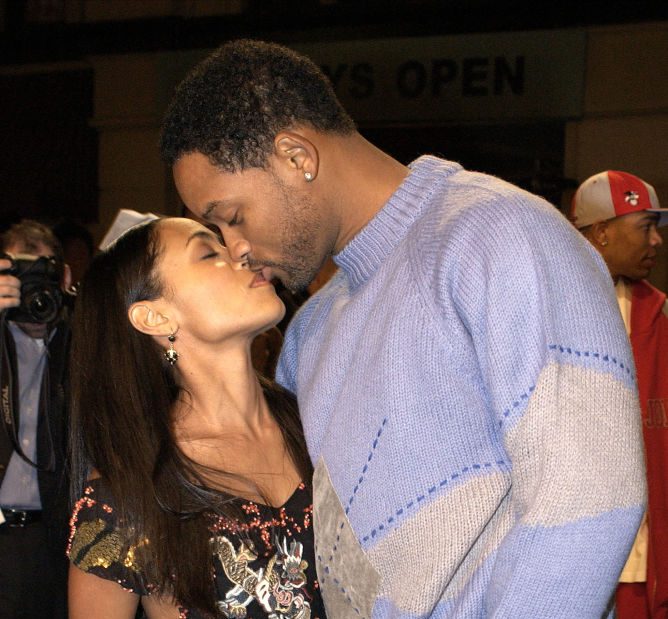
Source: Vince Bucci / Getty
In a recent interview for GQ Magazine, multi-award-winning actor Will Smith shares a glimpse into what he calls his “f*ck-it-50’s” and prepares readers for the release of his upcoming memoir Will— which is due out in November. Smith’s goal with releasing the memoir, according to the actor, is to separate who he is as a full human being from the expertly crafted Hollywood persona that many of his fans have come to know. Will, Smith says, will be filled with vulnerable truth-telling about his imperfect life. He’ll share details of a complicated relationship with his father, who he admits physically abused his mother, how he hides behind comedy as a means to avoid pain and abuse, and the many heartbreaks he’s experienced throughout his lifetime—including some that he faced in his current marriage to actress and talkshow host Jada Pinkett Smith.
Will Smith’s memoir may or may not reveal more intimate details about his marriage to Jada Pinkett Smith. After all, the couple laid a lot on the proverbial table during their one-one-one chat for an episode of Pinkett Smith’s talk show Red Table Talk, which aired in June of 2020. In that episode, Pinkett Smith revealed what she described as an ‘entanglement’ within her marriage where she had (what she now understands) was a complicated and possibly toxic relationship with singer August Alsina. Rumors about Will Smith and Jada Pinkett Smith being in an open marriage have been circling around gossip blogs for more than a decade. But it wasn’t until the infamous episode of Red Table Talk that the couple publicly confirmed the whispers.
As the GQ interview hit the internet, many readers rolled their eyes concerning the portions of the profile where Smith talks about his marriage. A lot of folks say they’re sick of being offered the messy details of the couple’s marital challenges. I believe the opposite to be true. In fact, I wish more couples were public and honest about the complications that they experience in marriage—and I think the Smiths marriage provides a great example of what non-traditional marriages can look like, and also how non-traditional approaches to relationships can still be filled with bad decisions, hardship and heartbreak. For instance, the Smiths remind us that open (non-monogamous) relationships can still be difficult to manage. Non-monogamy is not a cure all for troubled relationships, but with the right communication, investment and boundary setting, they may be an option more couples should consider.
According to this essay in The New York Times, 15% of women (because, yes, women ‘cheat’ too in marriages) and up to 25% of men have extramarital affairs. These percentages increase by 20% or more if we include emotional infidelity and affairs that involve other kinds of intimacy which may not be defined directly as sex. This means that up to 40% (or more) of marriages have to navigate cheating. Of course, cheating can happen in relationships for many reasons, but one reason—which both Will Smith and Jada Pinkett Smith admit to— happens as a result of a lack of desire to follow traditional scripts of monogamy in marriage. By accounts from both Will and Jada, Jada Pinkett Smith really had no desire to be involved in a conventional marriage—even while agreeing to marry Will. So, the couple worked to craft a partnership that allowed space for non-monogamy—a partnership that wasn’t rooted in ownership and didn’t feel like a prison.
Non-monogamy, and the opening of a relationship, is probably a much better fit for a lot more couples than we’d care to admit. Many individuals (and sometimes complete couples) feel guilt and shame around their inability to have their full needs met within marriages or other monogamous romantic partnerships. We are fed a script though out our lives that says our love for someone will take away our desires to connect (sexually and otherwise) with others. While love may be a force that allows space for monogamous commitments for many, for others it just isn’t enough. The above-mentioned statistics show this to be true. So, what if, like The Smiths, we opened ourselves up to what actually works for our individual partnerships, instead of making promises of fidelity that we simply can’t keep. Too many of us would rather commit to monogamy, then cheat, as opposed to admitting that monogamy just really isn’t what we want. Cheating, and overall being unethical in our monogamous commitments, is far more harmful than having honest conversations about who we really are and what we really can commit to around connection, intimacy and sex in our relationships.
Ethical non-monogamy as a choice in relationships is on the rise, according to this piece at BBC.com. In a survey published in 2016, that involved nearly 9,000 survey participants, one in five participants had experienced consensually, non-monogamous relationships. We can thank more depictions of non-monogamous relationships in the media and access to more information about the practice online for many people being more open to the idea of it. Still, there are limited depictions of non-monogamy that involve Black people. We can blame that on many things, including the traditional, religious social constructs that we feel we must adhere to. To me, this is why The Smiths openness about their non-monogamous relationship is so valuable, and why we shouldn’t be so quick to dismiss the experiences they share with us.
The Smiths also, through sharing their experience navigating Pinkett Smith’s relationship with August Alsina (and its aftermath), have shown us that even those who choose non-monogamy can struggle with ethics. Choosing non-monogamy requires continual check-ins and boundary setting, and the practice of non-monogamy can sometimes harm romantic connections more than it can help. Non-monogamy requires a level of honesty and authenticity with us and with our partners that, frankly, many of us struggle to achieve.
For those interested in learning more about how to begin thinking about whether non-monogamy is a good choice, this Bustle piece has some good questions to ask—including: what are your core relationship values, and is non-monogamy something you’d like to practice long-term? what aspects of your relationship will be open? will you be sexually open or only open to dating and other romantic connection? how much do you want to know about your partner’s experiences with others?
Non-monogamy, when practiced ethically, can help to build connection in romantic relationships instead of destroying it. We should thank The Smiths for pushing past societal judgements to live in, and outwardly express, their truths.
Josie Pickens is an educator, writer and cultural critic based in Houston, TX. Follow her musings on Instagram and Twitter at @jonubian.


